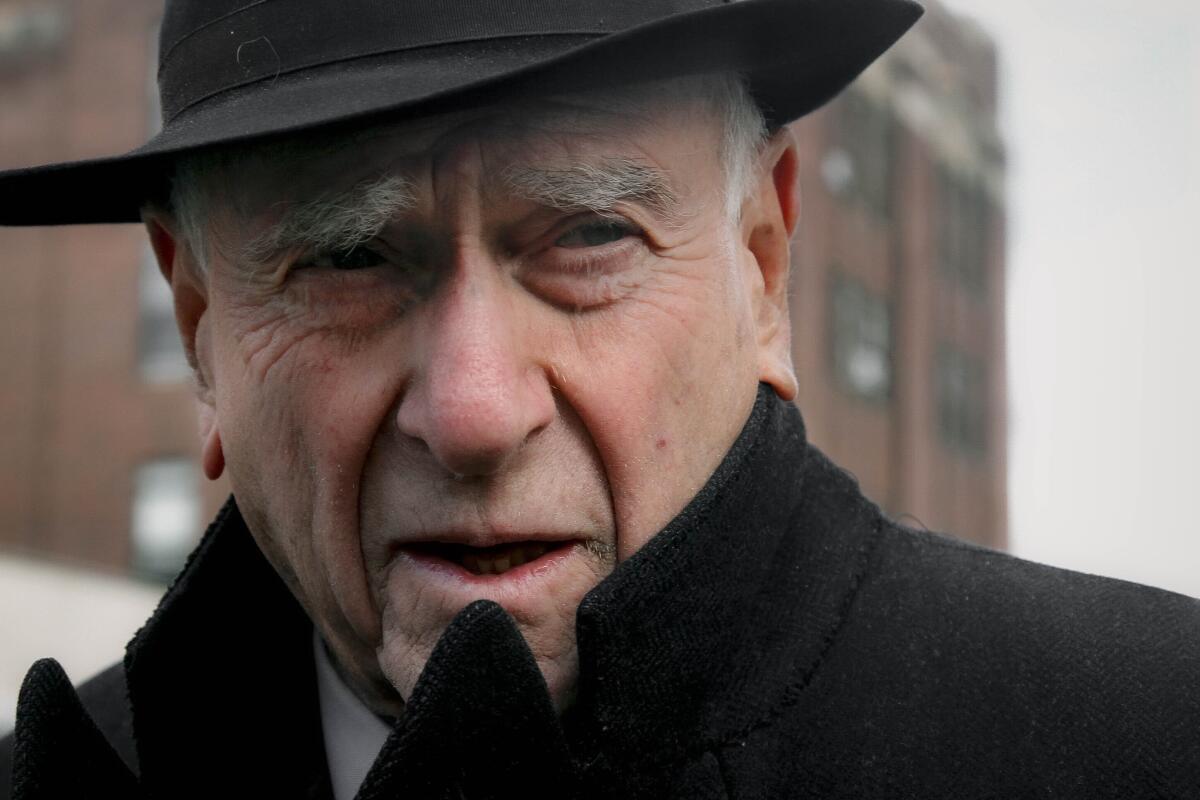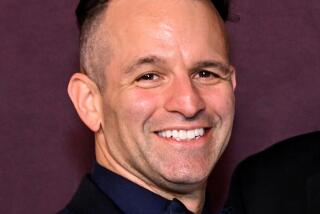Jack Weinstein, federal court judge who oversaw sensational mob trials, dies

- Share via
Jack B. Weinstein, a former federal judge who earned a reputation as a tireless legal maverick while overseeing a series of landmark class-action lawsuits and sensational mob cases in New York City like that of the “Mafia Cops,” has died at age 99.
A federal courthouse official, Eugene Corcoran, confirmed Weinstein’s death Tuesday. The judiciary “has lost a national treasure,” Corcoran said in a statement.
Weinstein, a World War II veteran appointed by President Lyndon B. Johnson, had spent more than five decades on the bench in Brooklyn before retiring last year. In a 2012 interview with the Associated Press, he said his longevity had its advantages.
“You don’t care really what people think of you,” the judge said. “You’re not going anyplace. You’re doing it for the joy. And as a public service.”
Weinstein was known for championing class-action litigation as the little guy’s remedy for alleged injustices by big industry.
He made headlines in 1984 by approving a settlement requiring herbicide makers to pay $180 million to Vietnam veterans exposed to Agent Orange. He also presided over a 1999 trial ending in an unprecedented verdict finding handgun makers liable in shootings and negligent in their marketing practices. And in 2006, he gave the green light to a class-action suit brought by tens of millions of smokers seeking up to $200 billion from tobacco companies for allegedly duping them into buying light cigarettes.
His rulings often upset conservatives, who accused him of sacrificing judicial restraint to promote liberal causes. In many cases, appellate courts found that his decisions had overreached.
In a book about mass tort litigation, Weinstein espoused a belief in “humankind’s obligation to create a just society.”
Weinstein was born in Wichita, Kan., and grew up in Harlem and Brooklyn. As a teenager in the 1930s, he played bit parts in Broadway shows and worked on the docks to put himself through school.
He later served in World War II before launching his legal career at Columbia Law School, where he graduated in 1948. He briefly went into private practice before serving as Nassau County attorney from 1963 to 1965. He had returned to Columbia to teach when President Johnson named him to the federal bench in 1967.
The 6-foot-2 Weinstein was a stately presence in court, where he favored business suits over robes and sometimes ventured off the bench in the middle of trials to get a juror’s-eye view of the proceedings. He was impatient with long-winded lawyers, critical of sentencing guidelines he felt were too harsh on low-level criminals and concerned about judges falling prey to hubris.
“One danger that every judge must guard against is ego,” he wrote in his book. “The court must control its own sense of importance — sometimes a very difficult chore.”
He also expressed a faith in juries’ ability to tackle complex and contentious civil cases.
Should a jury “be permitted to decide a vexing private litigation … when the decision has so many important overtones, or should the judges themselves decide by holding that the matter is beyond the ken of a reasonable jury?” he wrote in the light cigarette case.
In 1997, Weinstein added his scholarly touch to a ruling affirming a 12-year prison term for Vincent “Chin” Gigante, the Mafia “Oddfather.” The boss of the Genovese organized crime family had escaped prosecution for years by wandering the streets in a ratty bathrobe, acting like a mentally unbalanced person.
Quoting Shakespeare’s “As You Like It,” the judge wrote: “And one man in his time plays many parts. … Last scene of all, that ends this strange eventful history, is second childishness.”
Weinstein also put his unique stamp on perhaps the most stunning police corruption case in New York City history: the trial of two detectives accused of moonlighting as hitmen for the mob. After defendants Louis Eppolito and Steven Caracappa were convicted in 2006, the judge declared that they deserved life sentences for “the most heinous series of killings ever tried in this courthouse.”
A month later, he stunned prosecutors by throwing out the convictions based on defense arguments that the statute of limitations for the eight murders had expired. An appeals court overturned the decision.
Weinstein made news as late as 2019 by sentencing an American woman who admitted supporting the Islamic State group to four years in prison over the objection of prosecutors who wanted her locked up for decades.
True to form, he said the lenient sentence had the potential to “save her as a human being.”
More to Read
Start your day right
Sign up for Essential California for the L.A. Times biggest news, features and recommendations in your inbox six days a week.
You may occasionally receive promotional content from the Los Angeles Times.






